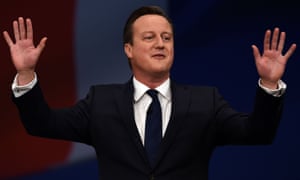
Go back a year to the Conservative party conference in Manchester. David Cameron basks in the “new light – the bluer light – that fell across our isles” when the general election results came in. George Osborne is Dave’s dauphin, a triumphant PM in waiting. Jeremy Corbyn isn’t getting good reviews after Brighton. Britain remains firmly in Europe, with only the Farage fringe and usual suspects cutting up rough. And across the pond there’s incredulity that candidate Trump is still standing.
“I was writing my speech and preparing to go and see Her Majesty. And I thought … I’ll just lie down and let it all sink in,” Cameron continues. “As I shut my eyes, Ed Balls had gone. And when I woke up and I switched on the radio, Nigel Farage had gone too. There was a brief moment when I thought it was all a dream. But there’s a serious point. Why did all the pollsters and the pundits get it so wrong?”
A question as relevant now as it was a year ago. Cameron, out of luck and out of Westminster, has a new career to find. George Osborne is in powerhouse exile. An ecstatic Farage has Brexit victory. Corbyn has just been thumpingly re-elected. And Trump, bombast unabated, faces Hillary Clinton in the great debate round two.
Cameron answered his own question, to be sure. Why were the pundits wrong? “Because, fundamentally, they didn’t understand the people who make up our country. The vast majority of people aren’t obsessives, arguing at the extremes of the debate. Let me put it as simply as I can: Britain and Twitter are not the same thing.” Cue a hollow laugh and a farewell wave. But cue, too, continuing introspection.
Our media world is awash in commentary and opinion. It increasingly majors on analysis and advocacy because digital can do breaking news in a flash. Commentators must make sense of what’s happened, explaining the trends of history. They can bring expertise to bear on specific events and policies. But the biggest picture of the lot – landscape with earthquakes and floods – is hidden from view. As you move from the collapse of the Soviet Union to, diminuendo, the collapse of Cameron, surprise overwhelms prediction. (And Michael Gove is eerily right about such expertise.)
Most compellingly, no one began even to hint at the political script that has played out over the last 12 months. No one today can be confident about anything in the passing parade. Look at that first Trump-Clinton debate. America’s front pages led on tentative conclusions like “Round one to Clinton” (Des Moines Register) or holding bromides like “Fighting words” (Orange County Register). Comment was suitably mixed too, from Democrat euphoria over the supposed outcome to this from the New York Post: “The first debate was roughly a draw – which is bad news for Clinton, because she needs to turn this race around, and she failed.”
Danny Finkelstein in the Times was studiously cautious. “It’s impossible to understand anything in American politics unless you appreciate the demographics. People see things differently depending on who they are. A comment that strikes one person as unreasonable and rude will strike another as a bold and colourful salvo., telling it like it is, courageously defending their interests” Which, coincidentally, is the basic conclusion of a new Pew Center study that finds Republicans and Democrats trapped in impermeable bubbles of their own experience, their whole existence shaped in different ways.
Even facts we’re supposed to accept as givens don’t stand much scrutiny. This wasn’t a “great debate” in audience terms. As Vox calculated, “there are roughly 250 million Americans eligible to vote. So if roughly 81 million Americans watched the debate, that means only 33% of the population who can vote in November bothered to tune in”. That’s barely Reagan v Carter, never mind Nixon v Kennedy.
And who knows what to make of Trump, this “strange, complex and comical figure”, asks Chris Jones, theatre critic of the Chicago Tribune, talking to James Warren of the journalism website Poynter. “The political class will scoff. The past is prologue. Ingrained assumptions rule. How could Trump’s peevish, sexist stumbling positively impact insiders’ targets of dissection, such as white suburban independent females? No way, right?”
Politics, in sum, has become an increasingly mystic, unpredictable business to write or think about. Last year’s heroes are this year’s rejects. The unknown voter always keeps his counsel. And one bit of testimony from James O’Brien, of LBC and Newsnight, struck a chord last week. “The media, myself included, now have to stop talking about Jeremy Corbyn like he is some sort of pimple on the backside of British politics and start talking about him as the only alternative prime minister to Theresa May.”
OK, countless pundits say Labour can’t win. It’s a risible story to write. But think back to Manchester 2015, ponder the months of upheaval: and remember the dictum of William Goldman, Hollywood scriptwriter supreme, with its message for pundits everywhere: “Nobody knows anything.”
■ James Purnell, former Labour minister, becomes BBC head of radio and much besides – poised to take on James Harding, monarch of news, and Charlotte Moore, monarch of TV, in the race to be next director general. Mild ructions follow. Can an ex-politician become theoretically supreme boss of Today? Which is rather like asking whether politics isn’t a ball and chain you carry through later life. Purnell is an agile thinker who’s made a new life for himself far beyond Westminster. He deserves his promotion, and chance.